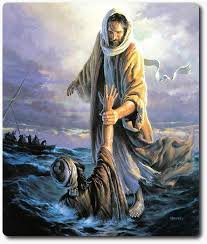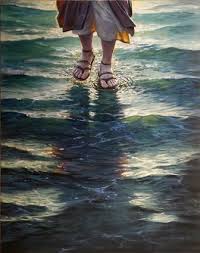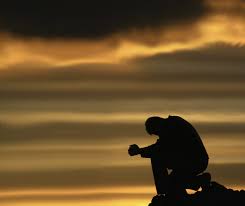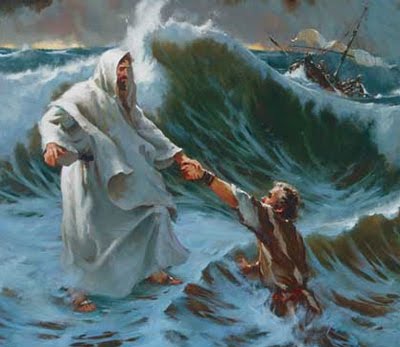
– 13-08-20 –
Nineteenth Sunday in Ordinary Time
Gospel Text: Matthew 14:22-33
vs.22 After having fed the crowds, Jesus made the disciples get into the boat and go on ahead to the other side while he would send the crowds away.
vs.23 After sending the crowds away, he went up into the hills by himself to pray. When evening came, he was there alone,
vs.24 while the boat, by now far out on the lake, was battling with a heavy sea, for there was a head-wind.
vs.25 In the fourth watch of the night he went towards them, walking on the lake,
vs.26 and when the disciples saw him walking on the lake they were terrified. “It is a ghost” they said, and cried out in fear.
vs.27 But at once Jesus called out to them, saying, “Courage! It is I! Do not be afraid.”
vs.28 It was Peter who answered. “Lord,” he said “if it is you, tell me to come to you across the water.”
 vs.29 “Come” said Jesus.
vs.29 “Come” said Jesus.
Then Peter got out of the boat and started walking towards Jesus across the water,
vs.30 but as soon as he felt the force of the wind, he took fright and began to sink. “Lord! Save me!” he cried.
vs.31 Jesus put out his hand at once and held him. “Man of little faith,” he said “why did you doubt?”
vs.32 And as they got into the boat the wind dropped.
vs.33 The men in the boat bowed down before him and said, “Truly, you are the Son of God.”
***********************************************************
We have four sets of homily notes to choose from. Please scroll down the page for the desired one.
Michel DeVerteuil : A Holy Ghost Priest, Specialist in Lectio Divina
Thomas O’Loughlin: Professor of Historical Theology, University of Nottingham
John Littleton: Director of the Priory Institute , Tallaght, Dublin 24
Donal Neary SJ: Editor of The Sacred Heart Messenger
****************************************
Michel DeVerteuil
Lectio Divina with the Sunday Gospels- Year A
www.columba.ie
General Comments
At first reading, today’s passage looks like one story, but in fact several stories are woven into it, and we cannot meditate on them all at the same time. We therefore separate the various strands and focus on one at a time. We might eventually find a link between them (the early Church did hand down the passage as a unity) but if we do find the link, it must happen spontaneously and in its own time.
In our meditation we choose our perspective. We can focus on Jesus, the ideal leader, parent, friend, spiritual guide; he is also the model of the Church in the world, and indeed of any alternative community which brings hope to the rest of humanity. On the other hand we can focus on those to whom Jesus ministers – the disciples, the crowd, St Peter. They are ourselves when we have a deep experience of grace and salvation.
Textual Comments
– Verses 22-23. Jesus sends away both the disciples and the crowds so that he can go up on the hills by himself and pray. This is the moment when those of us who have authority over others feel the need to get in touch with our deepest selves. We are able to distance ourselves from those we have responsibility for.
By doing this we also give them the space to find themselves – an essential aspect of exercising authority. Even though, like Jesus, we end up having to go and rescue them, it is still a moment of growth – for them and for us.
 – Verses 24-25. Jesus becomes aware (because he was at prayer?) that the disciples are in crisis; their boat is far out on the lake, they are battling against a high wind, he walks on the water to meet them. This is a deeply symbolical act in the bible, since the Jews saw the sea as evil, the dwelling place of terrifying monsters. Jesus walking on the water then, especially in a storm, is a deeply moving picture of the good person walking boldly and confidently into an evil environment. Here again we can make the link with Verses 22-23 – it was because he was faithful to his times of solitary prayer that he had the power to walk on the water.
– Verses 24-25. Jesus becomes aware (because he was at prayer?) that the disciples are in crisis; their boat is far out on the lake, they are battling against a high wind, he walks on the water to meet them. This is a deeply symbolical act in the bible, since the Jews saw the sea as evil, the dwelling place of terrifying monsters. Jesus walking on the water then, especially in a storm, is a deeply moving picture of the good person walking boldly and confidently into an evil environment. Here again we can make the link with Verses 22-23 – it was because he was faithful to his times of solitary prayer that he had the power to walk on the water.
– Verse 26. The focus shifts to the disciples. When they see Jesus they are terrified, thinking “it is a ghost”, but he encourages them. We too when we panic, become suspicious and fearful even of goodness; only gradually do we recognise that it is a moment of grace.
– Verses 28 to 32. The incident with St Peter is clearly a later addition to the main story. It has touched the imagination of Christians over the centuries, has been painted many times and has been the subject of countless sermons. Here again we can focus either on Jesus or on Peter:
– Jesus is the ideal leader and guide. The story reminds us that great leaders have the capacity to bring out the best in people – make them feel that they can step out and go beyond their usual limitations to do great things. A striking picture of the role of the Church in society.
– Peter represents us when we take a bold step and then once we have stepped out become afraid. Jesus the true friend challenges but does not reject – he continues to offer Peter his support.
– Verse 33. The climax of the story. Jesus finishes the task he set himself – he gets into the boat and the wind drops. We must avoid an escapist interpretation. Jesus does not always calm storms, what he always does is convey the message that he has power over the forces of evil.
The disciples experience the victory of goodness over evil, grace over sin, life over death. It is a moment of rest, of “blessed assurance” – “the wind drops” – and of security – “Jesus gets in the boat”. They know they are in the presence of God, so they “bow down before him”.
Scripture Prayer Reflection
“The more faithfully you listen to the voice within you,
the better you will be able to hear what is sounding outside.” ...Dag Hammarskjold
 Lord, teach us to be more like Jesus,
Lord, teach us to be more like Jesus,
to know when the time has come for us to be alone;
we insist that even our closest companions leave
and send away the crowds we have nourished,
so that we can go up to the hills by ourselves to pray.
In that place of inner silence we become aware of our brothers and sisters far out on the lake and battling with a heavy sea and a head-wind.
“Religion is often rejected as reactionary. Yet the Christian faith properly understood and wholeheartedly followed is a force for radical change and renewal.” …Cardinal Hume
Lord, our civilization is going through a great crisis.
We are like the apostles on a boat far from any shore, battling with a heavy sea and facing a head-wind.
There are people who want to take risks, to try new ways of doing things, and to create alternative institutions.
They will know that the Church is really the presence of Jesus if they hear us calling them to leave the safety of the boat and step out even though it means walking on the water.
“I am disarmed of the will to overcome, to justify myself at the expense of others, I am no longer on the alert, jealously guarding my riches.” …Patriarch Athenagoras
Lord, we pray that your Church may be present to the world,
like Jesus walking on the water, free of all desire to conquer or even to impress,
trusting only in your love and your truth.
“You know when you have met a saint; instead of feeling inferior, you feel enormously affirmed.” ...Margaret Hebblethwaite, after interviewing Cardinal Arns for the English Catholic paper, The Tablet
Lord, we thank you for the great people you send us on our life’s journey. They bring out the best in us so that, like Peter with Jesus, we cry out, “Tell me to come to you across the water!”
 Lord, there are times when we feel so disillusioned that even when you come to us with power
Lord, there are times when we feel so disillusioned that even when you come to us with power
– a friend whom we can trust,
– an invitation to a retreat,
– an opportunity for relaxation,
we think it is a ghost and cry out in fear.
But then we hear the comforting words, “Courage, it is I, do not be afraid.” Thank you Lord.
“The moment we cease to hold each other, the moment we break faith with one another, the sea engulfs us and the light goes out.” ...James Baldwin
Lord, we thank you for faithful friends,
the kind that when we feel the force of the wind and take fright,
we only have to say “Save me!” and at once they put out their hands and hold us.
Lord, prayer is experiencing that it is really you who are there with us,
feeling the urge to go beyond our limitations and to hear you say that we can do it;
then when we suddenly become aware of the risk we have taken and feel afraid,
to experience that you have put out your hand and held us. Thank you, Lord.
Lord, we pray that Jesus will be our model in our work of spiritual guidance.
When we find that those we are guiding have little faith, don’t let us become impatient or reject them; help us rather to put out our hands at once and hold them.
Thank you, ,Lord
****************************************************
Thomas O’Loughlin
Liturgical Resources for the Year of Matthew
www.columba.ie
Introduction to the Celebration
We live in a world that is shot-through with the glory of God. The Father has made us for himself that we might praise him; the Son has come among us to lead us towards the fullness of life; the Spirit dwells within us to enlighten our minds to the mystery that is greater than all we can see, touch, and taste.
Part of living a Christian life is becoming attuned to this presence. This is the focus of our reflection today as we gather to encounter Jesus in our common meal. But in this encounter we recognise that God is greater than all creation and is the very source of our being.
Homily Notes
 1. How do we learn to be Christians? The most common answer to that question is to say something like this: ‘I will study the teachings of Jesus and see if I believe them. If I think they are true, I shall then be a believer’ (while subconsciously adding: and if I call myself a believer in Jesus’s message, then I will be called a Christian).
1. How do we learn to be Christians? The most common answer to that question is to say something like this: ‘I will study the teachings of Jesus and see if I believe them. If I think they are true, I shall then be a believer’ (while subconsciously adding: and if I call myself a believer in Jesus’s message, then I will be called a Christian).
2. The problem with this is that Jesus is not just a religious wise man who offers us teachings. We do not simply believe his teaching, we believe in him. To believe in him is to believe that he is the Anointed, the Son of God. We do not simple believe that what he said is true, but we believe that he is the truth.
3. The church’s message is not just a set of teachings that he has given us; the teaching of his followers is that Jesus is the message of the Father to all humanity. Our teaching is Jesus: that he is the Christ.
4. The task we face is to learn to live in Jesus, to live in a style that is consistent with affirming our basic teaching as Christians: that Jesus is the way to the Father.
5. This is the challenge that lies behind today’s gospel. It is not just enough to listen to Jesus, we have to get out of our security zone and go to him, to commit ourselves to him, to trust him. To learn to be a Christian is to learn to behave with an obedient trust that amidst life’s difficulties and fears, he is the saviour.
6. The challenge of the gospel is not to ask whether you think it happened, or indeed whether or not you think it could happen. Such questions are not questions about faith, but about history or physics. The challenge is that each of us, and all of us as a community, has to be prepared to leave our boat and venture toward Jesus. It is only in going toward him in trust that we discover who he truly is.
 7. In a moment we will stand up and profess our faith. Note that we do not subscribe to a series of teachings or ideas which we might call ‘the teachings of Jesus’. Rather, we profess that we believe in Jesus, and we believe him to be the Son of God in union with the whole church. We believe him to be the Son who has shown us the Father, and who has sent us the Spirit who gives us life.
7. In a moment we will stand up and profess our faith. Note that we do not subscribe to a series of teachings or ideas which we might call ‘the teachings of Jesus’. Rather, we profess that we believe in Jesus, and we believe him to be the Son of God in union with the whole church. We believe him to be the Son who has shown us the Father, and who has sent us the Spirit who gives us life.
8. Now, let us assert together through the power of the Spirit, who transforms us from being a bunch of individuals in the church, that we are the people who believe that Jesus is the Christ, the Son of God, who comes from the Father.
************************************************************
John Litteton
Journeying through the Year of Matthew
www.Columba.ie
Gospel Reflection
Fear is very basic to our human condition. We are often full of fears, some of them irrational. So it might seem that, having just witnessed Jesus miraculously feed more than five thousand people (see Mt 14:15-21), Peter and the others were being irrational by expressing fear and anxiety when, in the midst of a storm at sea, Jesus walked towards their boat that was being tossed about by the wind.
But Peter was learning. His fear at finding himself in such a precarious position in the boat, while Jesus had gone up into the hills alone to pray, was somewhat abated when the apparition approaching them and, filling them with fear, offered this reassurance: ‘Courage! It is I! Do not be afraid’ (Mt 14:27). Peter was able to muster sufficient faith to respond: ‘Lord, if it is you, tell me to come to you across the water’ (Mt 14:28).
 This was indeed a leap of faith. Already filled with fear at finding himself in the middle of a stormy sea in a small boat, with only other terrified followers of Jesus for company, Peter asked for no proof that Jesus was who he said he was. Peter sought a command that would permit him to exercise his faith.
This was indeed a leap of faith. Already filled with fear at finding himself in the middle of a stormy sea in a small boat, with only other terrified followers of Jesus for company, Peter asked for no proof that Jesus was who he said he was. Peter sought a command that would permit him to exercise his faith.
Nonetheless, having bravely made this initial act of faith, Peter then began to doubt. The wind was raging around him and the waters were turbulent. He began to sink, and suddenly cried: ‘Lord! Save me!’ (Mt 14:30). The lesson for us here is that there is an ideal to follow when our own faith begins to crumble.
It is better, of course, not to doubt. Indulging in doubt has always been considered to be sinful by the Church. But if we fall, if we allow ourselves, like Peter, to doubt the power of Jesus momentarily — even to calm stormy seas — then let us immediately acknowledge that same power by asking for salvation, as Peter did.
Jesus responded to Peter’s cry for help by stretching out a saving hand, while at the same time rebuking him for doubting:‘Man of little faith, why did you doubt?’ (Mt 14:31).
This miracle teaches us about the supernatural character of the Church. If we think that the Church is a purely human institution, then we will be full of fear when it is tossed about on the winds of fashion and controversy. We will begin to doubt as Peter doubted. In that case, we must be prepared for the same rebuke given to Peter.
The truth is that Christ is in charge of his Church. Because of that, there is no reason for us to doubt. All that God asks of us is that we are faithful to him and to the teachings of his Church. Matthew’s account of this miracle concludes with the news that when they were all gathered together in the boat, with Jesus, the storm ceased. When they recognised his power, calm was restored.
The lesson for us is simple. The Church, notwithstanding its sinful members and their weaknesses, is a divine-human institution. It relies on supernatural help to achieve its mission which is the salvation of the whole world. There is no need for us to be fearful.
For meditation
The men in the boat bowed down before him and said,
‘Truly, you are the Son of God.’ (Mt 14:33)
*******************************************
Fr Donal Neary, S.J
Gospel Reflections for the Year of Matthew
www.messenger.ie/bookshop/
A hand to be Held
A most strange gospel story – Jesus walks on the water. It’s the type of gospel that suits a decision time, challenging us into deep trust – an invitation to come to the water; not to be afraid. It’s about trusting in Jesus, when there is nothing else. If you have human help, it’s great – but not the same as trusting in God.
In time of death, the call is to trust in God’s promise, because he is the way and the truth. Old age can be the same, or times in life when we just don’t know what the future will hold. It sounds unusual, but what Jesus does in this situation is very human. He doesn’t lecture or say a prayer, he just holds hands. Someone was given a book on bereavement after a family death – he said he needed a hand to be held, or his tears to be heard. That’s Jesus. He held Peter. Our God is a God with skin, with a human heart, who leaves big ideas behind when we are in trouble. Jesus just went across the lake, stopping his comfortable prayer.
 There are times when we just need to hold on to God in trust. On another occasion Peter would jump into the lake again – after the resurrection. Always a water man! Then he would be asked not just to hold a hand, but to be the hand that would reach out to others. Peter was prepared for his mission in many ways. As Pope Francis says, ‘When the Lord wants to give us a mission, wants to give us a task, He prepares us. He prepares us to do it well’ (June 2014).
There are times when we just need to hold on to God in trust. On another occasion Peter would jump into the lake again – after the resurrection. Always a water man! Then he would be asked not just to hold a hand, but to be the hand that would reach out to others. Peter was prepared for his mission in many ways. As Pope Francis says, ‘When the Lord wants to give us a mission, wants to give us a task, He prepares us. He prepares us to do it well’ (June 2014).
Remember a time when all you seemed to have was God; thank him.
Or recall when all you needed was God; ask him now for help.
Lord, in you I put my trust.